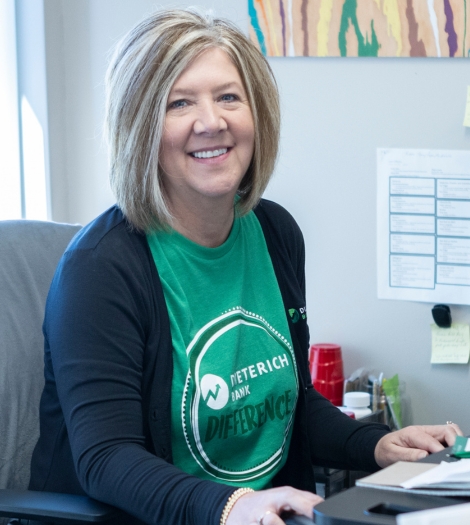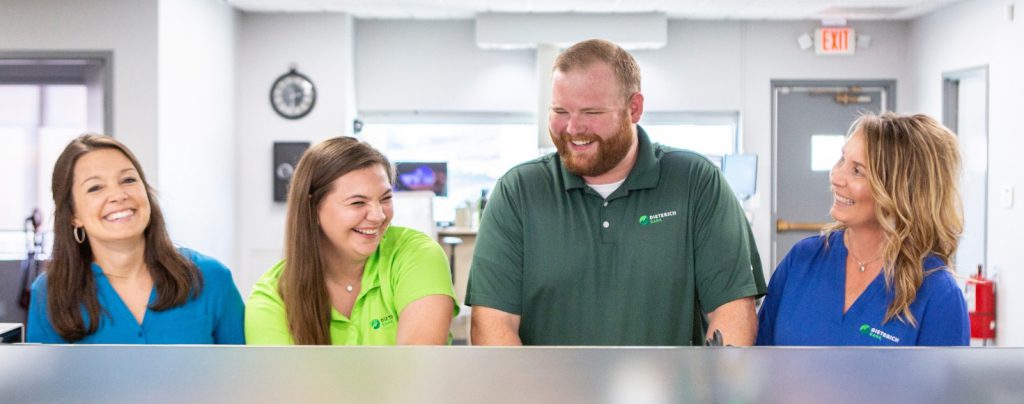Buying your first home is an exciting time in your life. Congratulations! Deciding on the right neighborhood, house style, and floor plan allows you to realize your dreams and explore new ideas. When realizing your dream of home ownership, the last thing you want is to be bogged down by a stressful mortgage process. Our guide to buying a new home will help explain the mortgage loan process and prepare you for the financial steps needed to successfully achieve move-in day.
How Much House Can I Afford?
The first step to buying a new home is identifying your price range. You don’t want to waste your time researching and touring homes that you can’t afford. On the flip side, you might be surprised to find that you can afford a larger house than you first imagined. In order to get pre-approved for a mortgage, an experienced loan officer will meet with you to discuss your current income, savings, and debt.
A knowledgeable community bank will also be able to explain what you’ll need for a down payment, tax considerations, and closing costs in your area. You can experiment with numbers on your own with Dieterich Bank’s online mortgage calculator. Typically, you’ll want to budget for a 20 percent down payment on your loan. The down payment eliminates the need to pay private mortgage insurance (PMI) which adds to your monthly house payment.
How Will My Credit Score Impact My Ability to Buy a House?
Your current credit score, income, debt, and assets will determine the interest rate a bank can offer you on your loan. You can keep an eye on your credit score with many free apps, including Credit Karma. These apps can show you what’s hurting your credit score and alert you to changes in your score. Entering the mortgage process with your best possible credit score will save you money in the long run. Qualifying for a better interest rate, even if just a few points lower, can add up to thousands of dollars over the next 15 or 30 years. Credit scores are typically categorized by the following values, and Credit.org shows you how your credit score could affect the amount of interest you payon the life of your mortgage.
Bad Credit: 300 – 549
Poor Credit: 550 – 619
Fair Credit: 620 – 679
Good Credit: 680 – 739
Excellent Credit: 740 – 850
How is My Credit Score Calculated?
Your credit score reflects many different facets of your financial life. In order to understand your credit score, you should know that there are two different types of debt.
Revolving Credit is typically associated with credit cards. You have a credit limit, make at least minimum monthly payments, and have no fixed term.
Installment Credit is typically seen as mortgage loans, student loans, and personal loans. You have a fixed loan amount and agree to make monthly payments until the loan is paid off.
Information that affects your credit score includes:
- Payment History – Making your payments on time is an indicator of financial health. 35 percent of your credit score is determined by debt payments. If you miss a loan payment, your credit score suffers.
- Credit Utilization Ratio – How much of your available revolving credit are you using? 30 percent of your credit score is determined by your credit utilization ratio. If you have one credit card with a credit limit of $8,000 and your credit card debt is $2,000, then you are utilizing 25 percent of your available credit. For the best credit score, aim to keep your credit utilization ratio below 30 percent.
- Credit History – The longer you have been managing debt and paying your bills, the better it is for your credit. 15 percent of your credit score is determined by your credit history.
- Credit Mix – Just having a credit card isn’t enough for the best credit score. Showing that you can responsibly manage a variety of debt products is important to creditors. 10 percent of your credit score is determined by the mix of debt in your name.
- Credit Inquiries – If you find yourself consistently applying for the latest credit card, you may be hurting your credit score. The number of new accounts that you’ve recently opened as well as the number of hard inquiries you’ve had in your name indicate your risk as a borrower. New accounts and credit inquiries account for the last 10 percent of your credit score.
What Do I Need to Buy a Home in Southwest Illinois?
The Federal Housing Administration (FHA) recommends that you dedicate no more than 31 percent of your gross monthly income to your house payment. More conservative financial advice sets that number 28 percent. The amount you commit to your mortgage payment should take into account your other debts and monthly expenses as well contributions to your retirement savings and emergency funds. Budgeting for your new home takes more than accounting for a mortgage payment. Monthly housing costs often include utility payments, internet/cable bills, repair costs, and HOA fees.
The debt-to-income (DTI) ratio is a good indicator of a consumer’s ability to handle their monthly payments. If your DTI is 20 percent, it means that 20 percent of your monthly income goes toward debt payments. Mortgage lenders prefer to offer loans to customers with DTI less than 36 percent. Take a good look at your income and expenses to make a sustainable budget for your home purchase.
Find a Home that Fits Both Your Budget and Your Family’s Needs
Once you’ve determined how much house you can afford and received pre-approval from a local bank, you will have a guideline for your home search. It may take a while to find a home that meets your budget and your needs. If you plan to stay in the area for many years, think about needs that might arise in the future. Adding children to your family often increases your need for bedrooms and a yard in which to safely play.
If you’re looking for a home in Edwardsville, IL you can expect to pay around $137 per square foot. The average sale price in the area is $265,000. Homes in Breese, IL are selling for around $227,000 with a median price of $107 per square foot. Closing costs will add to the price of your home purchase. Expect closing costs in Illinois to add two to three percent to your total purchase price. As an example, a house that sells for $240,000 would end up coming to $244,800 – $247,200 after closing costs. Closing costs encompass many types of fees including:
- Third-party fees
- Title Insurance/Search
- Taxes
- Escrow Fees
- Government Fees
- Loan Origination Fees
- Appraisal/Survey Fees
How Do I Research Mortgage Loans in Southwest Illinois?
Not all mortgages are created equal. The right mortgage lender will research available loan options to find the right mortgage for your situation. Mortgages tailored to first time home buyers, veterans, active duty military, rural housing, and borrowers with less than stellar credit are all available in Southwest Illinois. Dieterich Bank’s knowledge lenders can discuss the difference between a fixed rate mortgage and an adjustable rate mortgage (ARM) and what it means in the current market.
Community lenders know the ins and outs of real estate in your area. They can offer Metro East St. Louis home buying help and tips for buying a home in Breese and Edwardsville. Local lenders make fast decisions in-house rather than consulting a national headquarters. Fast decisions mean you won’t miss out on the house of your dreams. When you partner with Dieterich Bank, our loan decisions are based on more than just anonymous numbers on an application. Community lenders live in your town and have a vested interest in your well-being.
Get Pre-Approved for a Mortgage Today
Are you dreaming of a new home? Why not wake up and live in it? With a loan from Dieterich Bank, you can! Learn more about our mortgage lending options in communities such as Breese and Edwardsville. If you are ready to get started, you can Apply Now online. Our lending team is happy to answer any questions about the loan process. Stop by one of our convenient locations throughout Metro East St. Louis and Southwest Illinois or contact us by phone or email. With mortgage rates at a historical low, now is a great time to buy a home!








